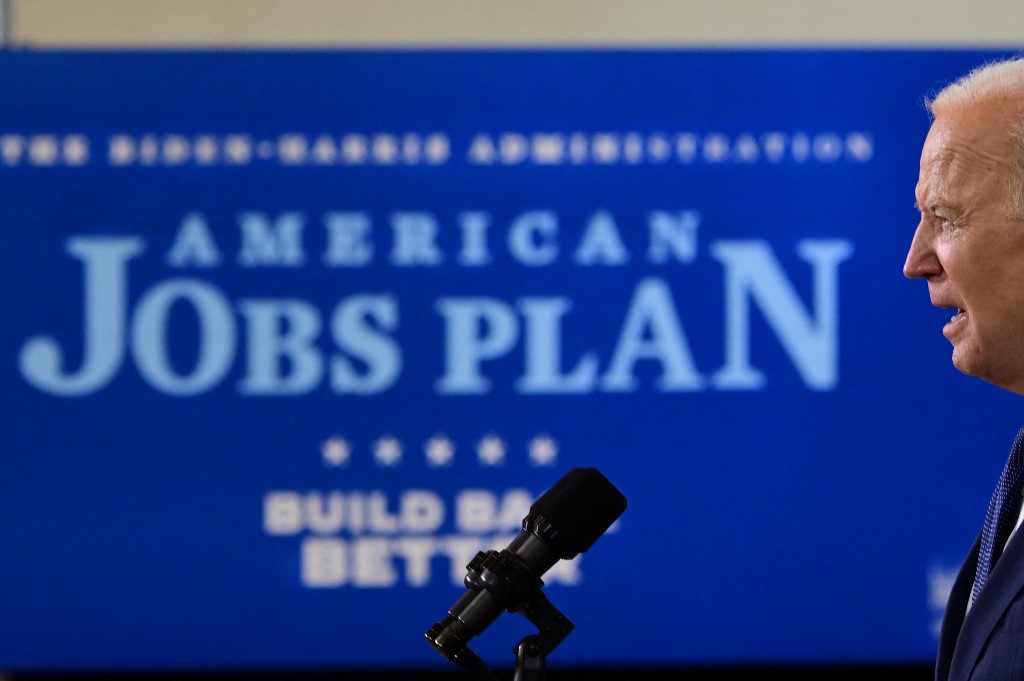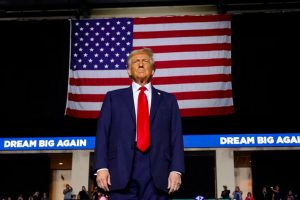Joe Biden on Wednesday unveiled his second trillion-plus-dollar proposal – this time to reshape the economy by building infrastructure, tackling climate change, boosting welfare and countering China’s expansion.
The US president’s sweeping “American Jobs Plan” – immediately compared with China’s vast Belt and Road Initiative – was denounced by Republicans as “far leftist” and a “Trojan horse” due to its significant bankrolling by higher corporate taxes.
“It’s a once-in-a-generation investment in America, unlike anything we’ve seen or done since we built the interstate highway system and the space race decades ago,” Biden said in unveiling the programme in Pittsburgh, a once prosperous steel town that has largely declined in recent decades until reinventing itself as a centre for healthcare, education and energy.
The plan would increase the corporate tax rate to 28% from 21% and close loopholes that allow companies to move profits overseas, according to a 25-page briefing paper released by the White House.
Biden said he had no problem asking companies to foot the bill and is “gonna put an end” to Amazon and other major companies paying little to nothing in federal taxes.
But Republican Senator Mitch McConnell said the proposal was “another Trojan horse for far-left demands”. McConnell said raising taxes would be “killing jobs and slowing wage growth when workers need a fast recovery.”
Biden’s second vast legislative proposal in two months in office sets the stage for a partisan clash in Congress.
MIXED REACTION
Markets greeted the plan with mixed emotions. “Biden’s spending plan lifted the Nasdaq Composite by 1.5% but Dow and S&P 500 were lacklustre below 33,000 and 4,000 respectively,” Chang Wei Liang, macro strategist at DBS in Singapore, noted.
“While the recently $1.9 trillion stimulus bill passed weeks earlier steepened the US Treasury yield curve, this new $2 trillion bill will be funded by higher taxes,” he added.
Analysts had a positive take on the plan. “The numbers are significant, pointing to an investment of $621 billion in transport infrastructure,” said Robert Gardiner, head of the Davy brokerage in Dublin.
“That includes about $115 billion of additional spend over eight years on highways and bridges. All in, we believe the additional funding adds 17% to existing highway spending.”
Gardiner acknowledged that tax hikes would hit corporate America, but noted: “The long-term spending plans are likely to far outweigh the tax impact.”
The biggest initial beneficiary would be the US infrastructure sector.
“We believe that upgrading the infrastructure, will not only benefit infrastructure construction firms, but will also attract private capital to fund investments,” said Thomas van der Meij, head of infrastructure strategy at Kempen Capital Management in Amsterdam.
ELECTRIC VEHICLES
The plan would upgrade 20,000 miles of highways and roads and repair more than 10,000 bridges, but the highlight of the infrastructure component is a $174 billion incentive for electric vehicles.
This aims to create domestic supply chains in areas such as battery manufacture, provide point of sale incentives and a national network of charging stations. A further $85 billion is proposed to modernise existing mass transit, $111 billion to upgrade water infrastructure and $100 billion to upgrade the power network.
Biden earmarked $213 billion to build and retrofit more than 2 million “affordable and sustainable homes”.
“Following previously announced measures from other parts of the world, such as the Chinese Belt and Road Initiative, the unveiling of this latest infrastructure plan marks the next catalyst in a series of proposals that will help the infrastructure asset class continue on its multi-decade growth path,” van der Meij said.
Coupled with his recently enacted $1.9 trillion coronavirus relief package, Biden’s infrastructure initiative would, like those of China, give the federal government a bigger role in the US economy than it has had in generations.
One estimate foresaw the plan as accounting for 20% or more of annual output.
• With reporting by Reuters
ALSO SEE:
China’s infrastructure REITs programme faces a bumpy path
























